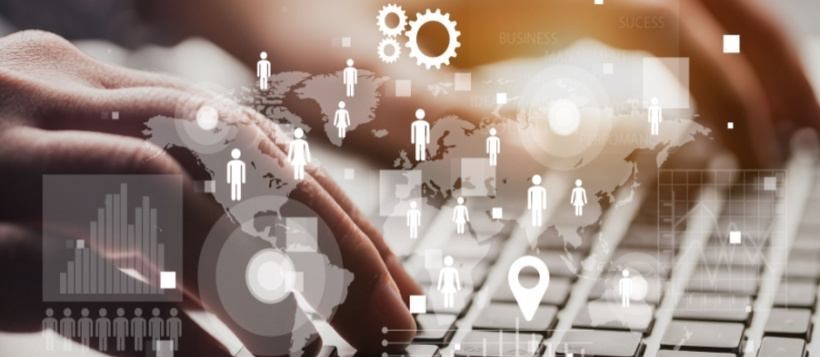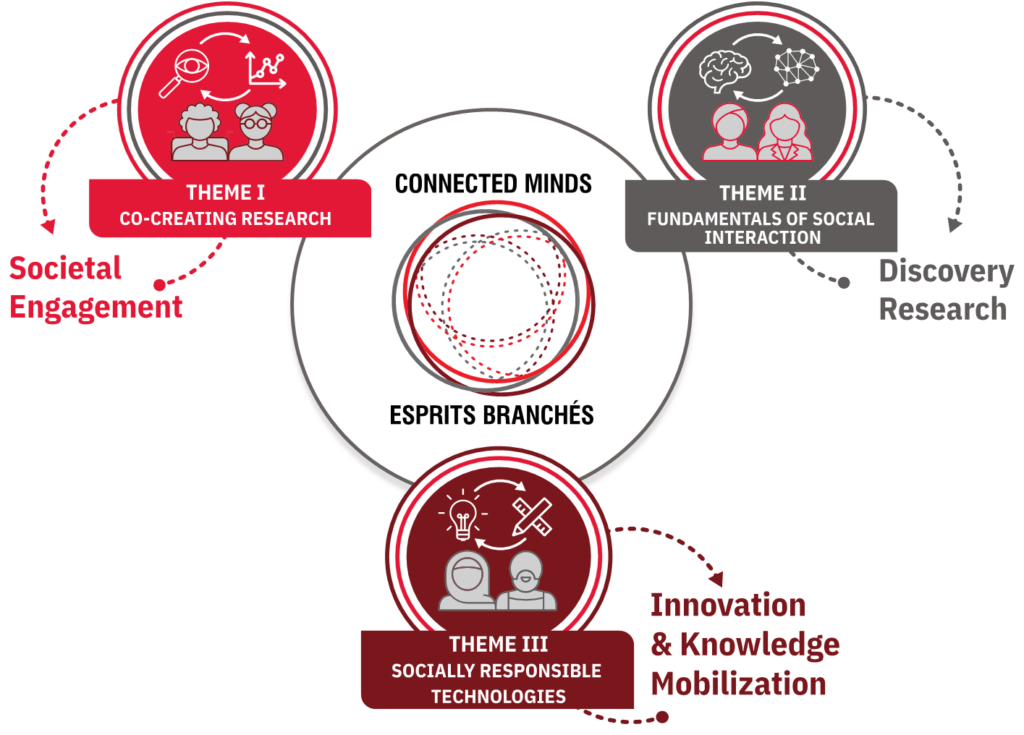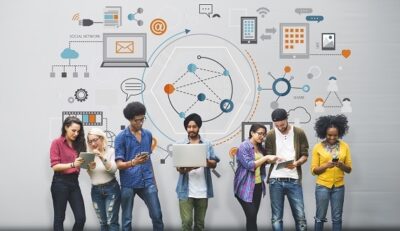
At Connected Minds, our research is driven by three long-term goals that guide our exploration of human-technology interactions and their societal impacts:
- Understand how the interplay of humans and intelligent technologies produces unexpected, emergent properties at the community/whole society levels
- Predict how new technologies will disrupt the techno-social collective
- Use these predictions to drive new research and technology development.
As such, we expect all funded initiatives and awards to contribute towards the long-term goals of our program.
By mobilizing resources around three central research themes, Connected Minds is co-creating innovative solutions that address pressing societal challenges:
Theme I: Co-Creating Research for Societal Needs and Impact.
Our research involves working with experts from a wide range of fields, including Indigenous communities, to identify pressing societal needs and co-create research approaches to address them. By collaborating with non-academic partners, we aim to ensure that our research is relevant, impactful, and informed by diverse perspectives.
Theme II: Fundamentals of Social Interaction: Neural, Algorithmic, and Social Networks.
We are investigating the different scales of social interaction, from the smallest cellular and algorithmic processes involved in individual behaviour to complete social networks comprising both humans and machines.
Theme III: Developing Ethical and Responsible Technologies.
In collaboration with partners from industry, healthcare, government, and not-for-profit sectors we are developing intelligent technologies that promote a healthy, just society. We will also advocate for policies that support ethical technology development and validate our work on a global scale.

In order to achieve Connected Minds’ aims and goals, our position is that one must understand 1) humans, 2) intelligent technologies, and 3) how they interact at social levels. It is our strategy to integrate expertise across the three pillars, defined below:
1) Society:
This encompasses expertise in areas related to the Social Sciences, Humanities, Arts, Indigenous Studies, Education, Policy, and Law relevant to the goals of understanding how humans and intelligent technologies interact in our evolving techno-social collectives. Fields of study may include social psychology, cultural anthropology, architecture, engineering, rehabilitation sciences, technoscience, linguistics, philosophy (e.g., ethics, philosophy of mind), digital media, performance, community health and health services, law (e.g., IP, regulatory, human rights), policy (e.g., health, guidelines for technology development).
2) Neuroscience and Behaviour:
This encompasses expertise in human neuroscience, and related behavioural and clinical sciences (e.g. rehabilitation therapy, nursing, medicine) relevant to the biological, cognitive, social and behavioural aspects of the human side of human-machine interactions. Specific examples may include social, cognitive (perception, attention, memory, action, language), developmental and computational neuroscience/psychology, as well as study of dysfunction in these processes in disciplines such as neuropsychology, psychiatry, and neurology. This also may involve the use of non-human species as models for human neuroscience and behaviour.
3) Intelligent Technologies:
This encompasses expertise in computer science, engineering and the sciences that contribute to the theory and application of intelligent technologies that interact with human beings to form techno-social collectives. Examples include research in areas such as network science, data science, AI, human-computer interaction, signal theory, digital communications, computer vision. robotics, autonomous vehicles, large language models, virtual and augmented reality, brain-machine interfaces, and data sovereignty and stewardship.

Note that most Connected Minds funding programs (including all research grants and training awards) require interdisciplinary academic collaboration, multisector collaboration, with emphasis on co-creation.
Here are some simple rules for co-creation in our program:
- ‘Horizontal’ co-creation: All Connected Minds research and training projects must engage at least one internal advisor/collaborator and external collaborator to bring interdisciplinary expertise and perspective to the project. These collaborators must be involved in both the planning and execution of the project. Internal collaborators/advisors must come from a different Expertise Pillar (see above) than the principal investigator/ supervisor and (unless strongly justified) should not come from the same academic unit.
- ‘Vertical’ co-creation. Any applied project that aims to influence or affect a non-academic community, i.e., through policy, practice or technology, must engage members of the target community in the design, implementation and evaluation of the project, and seek feedback from these communities at each step.
- The choice of these collaborators, advisors and partners should be clearly justified in terms of their expertise, role, and the specific goals of the project.
Resources on co-creation:
•https://www.coacch.eu/wp-content/uploads/2018/03/2811-COACCH-Co-creation-guideline-web.pdf
•https://backlogs.net/wp-content/uploads/2019/04/Research-Co-creation-toolkit-guidebook.pdf
•http://gonano-project.eu/road-of-co-creation-training-materials-researchers-engineers/
•https://blogs.helsinki.fi/andaction/files/2018/02/HY_Co_creation_web.pdf
